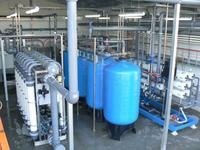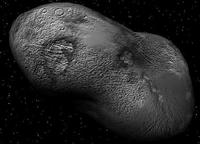-
Wastewater recycling adds to greenhouse gas emissions

New research shows that wastewater recycling processes may generate more greenhouse gases than traditional water-treatment processes; still, there are good reasons to continue keep wastewater recycling among the water-resource tools for urban areas
-
-
Uncovering mechanisms key to fusion reactor walls
A new tool will be hitched to an experimental fusion reactor at Princeton University to learn precisely what happens when extremely hot plasmas touch and interact with the inner surface of the reactor; fusion powers the stars and could lead to a limitless supply of clean energy
-
-
DRC wins DHS contract to help protect federal, state, and local agencies
On Tuesday Dynamics Research Corporation (DRC) announced that it had won a new blanket purchase agreement with the General Services Administration and DHS to provide a range of support services to federal, state, and local government agencies
-
-
Virginia quake highlights overlooked danger: decrepit dams
Tuesday’s Virginia earthquake raised fears that a Fukushima scenario would unfold somewhere on the East Coast, but experts say that earthquake pose a much greater threat: breaching decrepit dams; of the 85,000 dams in the United States, 4,000 are seriously unsafe or deficient — and of those, 1,800 are located in areas where a breach would cause grave damage to life and property
-
-
U.S. makes nuclear fuel available to other countries
The United States announced the availability of a reserve stockpile of low-enriched uranium (LEU) for use in nuclear fuel; the LEU is derived from down-blended surplus military material; the LEU will be made available to countries interested in nuclear power generation, thus making it unnecessary for these countries to develop their own uranium-enrichment technology
-
-
Thermopower waves advance a new energy future
Thermopower waves in thermoelectric materials can convert heat from solid fuels into electrical energy, in research that advances the vision of “smartdust” and other truly autonomous micro and nanomachines; “smartdust” systems are micro-electromechanical systems that are networked wirelessly for sensing and receiving data, for example testing pH of soil in large agricultural fields or quality of water reserves
-
-
Water mist puts out fires at low pressure
A new water mist system allows for fires to be extinguished from a distance of eight meters; the system’s special nozzles generate a fine mist of tiny water droplets; the water and the propellant nitrogen are non-hazardous, environmentally friendly, and leave no residues
-
-
Redirecting menacing asteroids

Sometime between 2029 and 2036, the asteroid Apophis will come uncomfortably close to Earth; if the asteroid, which weighs forty-six million tons, were to strike Earth, it would cause damage for thousands of miles around the epicenter; scientists propose ways to nudge the menacing asteroid off its current course
-
-
Bacteria--Energy Producers of the Future?
A lot of the water we use daily goes to waste — whether it goes down drains, sewers, or toilets, much of it ends up at a wastewater treatment plant where it undergoes rigorous cleaning before it flows back to the environment; researchers are looking at processes which would turn wastewater into energy
-
-
Sector Report for Monday, 22 August 2011: Infrastructure protection
This report contains the following stories.
Plus 1 additional story.
-
-
Cyber experts dispute McAfee's Shady RAT report

Earlier this month, cybersecurity experts discovered a five-year operation that infiltrated U.S. government and UN computer networks; China is believed to be the culprit behind the systematic attacks, dubbed “Operation Shady RAT,” which also hit major defense contractors and private businesses; many within the cybersecurity community are disputing the significance of the finding
-
-
USSI showcases port security system
To help secure U.S. ports and waterways which provide a vital link to the global supply chain, US Seismic Systems Inc. (USSI) has developed an underwater fiber-optic sonar system that detects small craft entering protected areas
-
-
Tap water in Copenhagen contaminated with E.coli
Parts of the Danish capital Copenhagen were without clean drinking water Saturday after high levels of the E.coli bacteria were detected in the municipal tap water system
-
-
Cleaning water while generating energy
A fuel cell system that can generate electricity from organic compounds and clean up wastewater at the same time has been developed by scientists in China; the cell uses light energy to degrade organic compounds in wastewater, generating electrons that pass through to the cathode, which converts the chemical energy into electrical energy
-
-
Making rail travel more reliable
U.K. researchers are collaborating with industry to develop novel optical sensors that detect when overhead power lines are likely to fail; the costly disruption to rail travel caused by the breakdown of overhead power lines could thus become a thing of the past
-
More headlines
The long view
Falling Space Debris: How High Is the Risk I'll Get Hit?
An International Space Station battery fell back to Earth and, luckily, splashed down harmlessly in the Atlantic. Should we have worried? Space debris reenters our atmosphere every week.
Using Drone Swarms to Fight Forest Fires
Forest fires are becoming increasingly catastrophic across the world, accelerated by climate change. Researchers are using multiple swarms of drones to tackle natural disasters like forest fires.
Strengthening the Grid’s ‘Backbone’ with Hydropower
Argonne-led studies investigate how hydropower could help add more clean energy to the grid, how it generates value as grids add more renewable energy, and how liner technology can improve hydropower efficiency.
LNG Exports Have Had No Impact on Domestic Energy Costs: Analysis
U.S. liquified natural gas (LNG) exports have not had any sustained and significant direct impact on U.S. natural gas prices and have, in fact, spurred production and productivity gains, which contribute to downward pressure on domestic prices.
